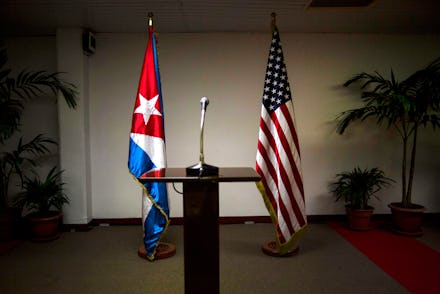Why Obama's Cuba Policy Is Even More Shrewd Than Anyone Thought

The first round of negotiations between the United States and Cuba drew to a close this week, and it's clear that those who rang the alarm bells over renewed diplomatic engagement with Cuba were premature in their criticism. Though Cuba has been recalcitrant, the U.S. has held fast in its demands for reform.
The negotiations are just one part of the Obama administration's overtures toward Cuba. The proposed actions are grounded in theory and experience, but they would still fundamentally challenge the core of the American doctrine on Cuba.
Any slight mention of rapprochement bristles the hair on the back of the neck of the Cuban exile establishment — but Obama's proposals fall purposefully short of unilateral capitulation to the Castro regime. Obama observed that isolation has not resulted in a democratic Cuba, so his administration proposed a new way forward that relies on the American people as beacons of liberty, freedom and democracy.
Everyday Americans as diplomats: Sociologists have long known interpersonal interactions lead to the transmission of social values and ideals, and potentially even political systems. Professor Peggy Levitt describes her extensive research into how exactly those "social and political remittances" are transmitted in her book, The Transnational Villagers. She found that the efficacy of transmission is dependent on who the sender is, the clarity of the pathway, the target audience, the relationship between countries and what exactly is being transmitted. Complex ideas, like a system of government, are much harder to transmit. But simpler concepts, like American materialism, have more readily transmitted to other cultures.
There is little that can be done from a policy perspective to control the content of the remittance, but it is possible to affect the dynamics of the sending pathways. This is precisely what Obama has done. By decreasing barriers to visas, raising limits on monetary remittances and generally streamlining personal economic interactions, he has effectively increased the number of pathways through which Americans and Cubans can connect.
Although political remittances are highly complex, they can be transmitted. Clarisa Pérez-Armendáriz and David Crow conducted an extensive study on Mexican migrant communities to test whether experiences as migrants or interactions with migrants had an impact on the political lives of Mexicans. They found a positive correlation between having interacted with those who have lived in the United States and having democratic values, being politically active beyond voting or participating in civic associations and protests. In short, they found that there is a "strong case that [Mexican] migrants are agents of democratic diffusion."
Isolation did not and does not work: Over the past half-century, the United States pursued a strategy of isolation, hoping and assuming that Cuba would collapse without international support and, on its way to becoming a democracy, atone for the sins of its revolution. Obama acknowledges that this approach has not worked in ousting the Castro regime. So the question wasn't whether he should alter the policy; he had to ask what changes were within his power to make and which were politically feasible.
Among the great number of changes that were announced last December were a series of modifications to visa regulations and other rules governing interactions between Cubans and Americans. These reforms have enormous long-term potential to help the U.S. achieve strategic goals.
A refreshing shift: Obama's actions on Dec. 17 did not fundamentally alter America's endgame when it comes to Cuba. They did represent a shift, however, in how those goals can be achieved. The U.S. is introducing a strategy that is far more solidly grounded in experience and reality than what came before.
Instead of trying to affect change via intimidation (as the political, military and economic power broker of the region), this strategy relies on the power of individual Americans to affect change on the island. These unilateral changes will complement any gains from the ongoing high-level negotiations in which Assistant Secretary of State Roberta Jacobson has already represented U.S. interests.
It's refreshing to finally see a case of shrewd diplomacy in the post-9/11 era of military posturing around the world.